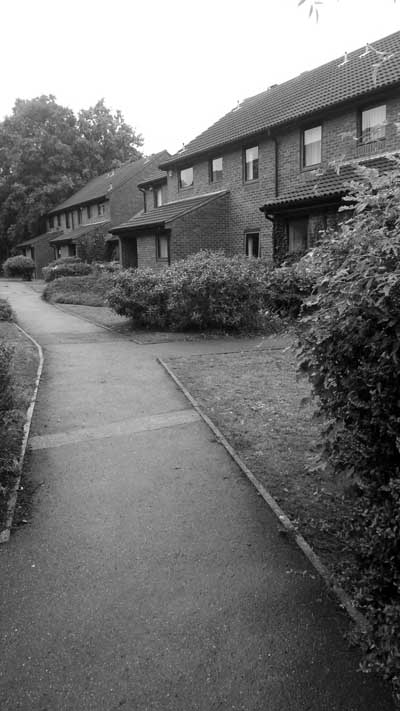When care hospitals closed, promises were made to patients – and broken...
Are people valued?
WORKERS, NOV 2013 ISSUE
Darenth Park, a vast Victorian building near Dartford in Kent, opened its doors in 1878 for people with special needs or for those deemed socially unrespectable – such as young unmarried girls seen as bringing shame on their families, people who were slow learners or people who were seen to be the “village idiots”. Many children were left at the hospital gates with just their name and date of birth while their families moved and left no forwarding address.

Up the garden path? Many Darenth Park residents were told they had a home for the rest of their lives at Bassets Close, Bromley (pictured above) – then the council sold off the accommodation and transferred the residents to private providers.
Photo: Workers
By 1970 the population within the institution had grown to 1,500 across 40 wards, 10 of which each contained more than 50 residents.
In August 1988 the last of the residents – all promised they would be moving once and only once – were transferred and the hospital finally closed its doors. Around the country, other similar institutions were being shut in the same way.
Many residents from Darenth were housed at centres designed for them, for example Bassets Close in Bromley, south London – bungalows in quiet surroundings that could house eight to ten residents all with similar needs and abilities, which was a huge improvement from what they’d had and how they used to live. They were told it would be their home for life.
At the heart of the bungalows was a centre that housed doctors, a dentist, a restaurant, art rooms, cookery rooms and sensory rooms, all of these there to cater for people with learning disabilities.
Staff, nurses and carers were all trained to look after the clients. Staff of all levels knew the clients well and after many years all became a large family. Many days out and holidays were enjoyed.
A choice?
In March 2001 the Government introduced a White Paper Valuing People, which set out four key principles: Civil rights, Independence, Choice, Inclusion. In its opening statement we find: “People with learning disabilities are amongst the most vulnerable and have a choice who cares for them.” What does this mean for the people who had come from places like Darenth Park to the centres like Bassets Close that were created to care for them? In fact, Bassets Close was closed and the staff and residents moved to a private provider.
Some 210,000 people have severe learning disabilities in England alone, and about 1.2 million a mild to moderate disability. Health and social services expenditure on services for adults with learning disabilities stands at around £3 billion.
The White Paper says that day services are often not tailored to the needs and abilities of individuals, but instead of improving and updating these day centres they have been closing too. In the borough of Bromley, for example, five centres have closed in the past five years!
In July 2008 private providers, many of them charity-run organisations, took over the care for people with learning disabilities. One such private provider, which took over the residents from Bassets Close, stated it was “realistic about people’s hopes and needs and will go the extra mile”, but also bragged “we quickly became experts in managing the very difficult transition successfully”.
It failed to mention that the staff it agreed to take over with the residents would be made redundant 18 months after the transition – to be replaced on night shifts by cheap immigrant labour, causing the residents to endure a night-time raid by armed police looking for illegal workers.
The same provider has now lost the tender for financial assistance for a third of its homes to companies that claim they can deliver care at a lower cost still. But at what cost to vulnerable adults?
The grim results of government policy are to be seen all over the country. One worker at a care home, speaking under the condition of anonymity, told Workers of an institution where residents were isolated in their own bedsits with their door locked. Staff who challenged this were asked, “Do you leave your front door open?” Wheel-chair dependent residents were placed on first floor bedsits but have never been given emergency fire evacuation chairs in case of a fire despite many requests by the fire department.
At the same institution, the worker said, residents unable to do their own shopping went hungry because staff were told if they went shopping without the resident, even if the resident was ill, they would face disciplinary action. Staffing levels have been kept low to increase the provider’s profits by installing technology which failed to work, meaning that seizures went unnoticed, leading to emergency services being called.
Are the people with no voice being heard, do they feel safe and valued by being sold off to the lowest bidder in a race to the bottom? ■